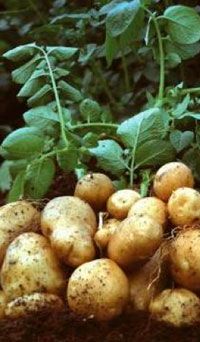Scotland introduces ‘zero tolerance’ on Dickeya to protect potato crops

Scotland has introduced a “nil tolerance” on Dickeya solani, a new more aggressive form of blackleg, to protect potato crops this season.
The zero tolerance policy has been incorporated into the Scottish Seed Potato Classification Scheme (SPCS), following a consultation.
The new law covers all classes of potato seed entered under the scheme.
The main threat comes from the 1% of potato seed imported into the country, says Mark Prentice, head of seed and export at the Potato Council. Fortunately, Dickeya has never been found in potato seed of Scottish origin.
“Imports are a potential introductory route for Dickeya. The risk, albeit small, is there,” he warns.
Seed crops will undergo testing for blackleg symptoms in late June or July, with government inspectors also concentrating on ware crops grown from imported seed crops.
Plants showing blackleg symptoms, such as plants wilting and tuber rots, will be sent to the government agency SASA, for testing.
“If Dickeya is picked up in a seed crop, it will be removed from the classification scheme and will only be allowed to be marketed as ware. Restrictions on subsequent handling and marketing of ware are also anticipated,” Mr Prentice says.
“Protection measures will be put in place to prevent any cross-over from infected stocks and clean stocks.”
The exact measures that will be put in place have yet to be decided.
But Mr Prentice says there is no single standard and diseased crops, including those grown for ware, will be assessed on a case-by-case basis depending on risk and plans for the crop.
Meanwhile, early indications suggest that Dickeya is more aggressive than traditional blackleg.
“Dickeya appears to operate in warm and cool conditions,” Mr Prentice says. “It would be harder to manage and causes problems in the growing crop from yield loss – up to 30% – and storage.”
And the impact of Dickeya, a non-quarantined disease, could be more serious if it infiltrates British crops, he warns.
“Without quarantine status there is the potential for the disease to spread unchecked,” says Mr Prentice.
“So regulations have been put in place in Scotland to give British seed growers and their customers at home and abroad some protection.”
By 2007, around £22m of losses were directly attributed to Erwinia and Dickeya in Holland. The disease has since established itself in a number of European countries, including Belgium, France, Finland, Poland and Spain.
Dickeya was first discovered in England in a seed crop in North Yorkshire in 2007.
Ten cases of Dickeya solani were identified in England and Wales on seed and ware crops in 2009, while two cases were found in ware crops grown from imported seed in Scotland.

